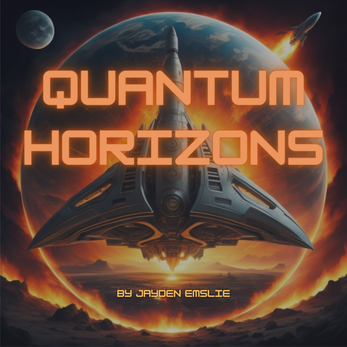Quantum Horizons - CRWR 312
Quantum Horizons - Artist Statement
At its core, a story is simply a telling of events. For this assignment, I draw upon my Craft of Play theory that stories are reiterations of existing knowledge, and Quantum Horizons is no exception. As I stated in my Craft of Play, there is no such thing as a black-and-white binary, regardless of the illusion of binaries– such as the ‘A’ or ‘B’ choice mechanic of Bandersnatch that I have employed in this game (Slade, 2018). Although, mechanically, there may only be one or two choices that propel the story, these choices are always subconsciously formed by external experiences, and as James P. Carse (1986) emphasizes in Finite and Infinite Games, “the game that was played at that time by those players can never be played again,” which means even if one plays the same game and presses the same buttons over again, their experiences are shaped by different sets of knowledge each time, e.g. playing a game the exact way again, but knowing the results of each button inherently shape the game differently compared to the first round (19). Similarly, our class discussion about Tic Tac Toe furthers the idea that although there are technically binary choices, there are always more options than what is presented, such as exiting the website or leaving a comment instead, which all count as actions that fall outside of the binary. These illusions of choices and binaries are further explored within Quantum Horizons, as the inspiration drawn from my playgroups’ run-through of Microscope (Robbins, 2011)supplements the idea that stories are mere remixes of other stories (e.g. the inclusion of the characters Vincent and Jason from our initial run-through), as Microscope was also a reiteration of my group's preceding ideas, drawing from content such as high-class society leaving the dying planet in search of something better in the film Don’t Look Up (McKay, 2021)or the mistreated clones in the book Never Let Me Go (2006) by Kazuo Ishiguro. Essentially, the basis of true freedom of choice does not exist, as it is founded on preconceived notions that shape the way games are played. Having said that, the game itself draws upon themes of exploitation, capitalism, labour, climate change, and classism, and these social dynamics have the opportunity to influence the way people make choices, based on their social positioning within these structures that are very real and influence our daily lives outside of play. To further the psychological nature of including these themes, I decided to write this game in second-person direct address to make it more personal and visceral, which is heavily inspired by the (literally physically interactive) pressing-forward feeling of Even Cowgirls Bleed (Love, 2013). At the end of it all, I hope that Quantum Horizons forces players to examine how their decisions are ultimately the cause of their rise or their demise, and how their internalized biases play a role in forming the narrative. Why did you choose the violent route? Or did you choose a peace-keeping route? In the end, did it really make a difference?
References:
Carse, James P. “There Are at Least Two Kinds of Games.” In Finite and Infinite Games: A Vision of Life as Play and Possibility, 1–34. New York, NY: The Free Press, 1986.
Emslie, Jayden. 2023. "Microscope – Play Lab Notes" Unpublished, CRWR 312. Vancouver, BC: University of British Columbia.
Emslie, Jayden. 2023. "Wanderhome + Players Choice Close Read" Unpublished, CRWR 312. Vancouver, BC: University of British Columbia.
Love, Christine. Even Cowgirls Bleed. Twine. 2013.
McKay, Adam, dir. Don’t Look Up. Film. United States: Paramount Pictures, 2021.
Ishiguro, Kazuo. Never let me go. Toronto, Ontario: Penguin Random House Canada, 2006.
Robbins, Ben. Microscope. Lame Mage Productions. 2011.
Slade, David, dir. Bandersnatch. Netflix, 2018.
| Status | Released |
| Platforms | HTML5 |
| Author | jayden.emslie |
| Genre | Interactive Fiction |
| Made with | Twine |
| Tags | Sci-fi, Singleplayer, Text based |

Leave a comment
Log in with itch.io to leave a comment.